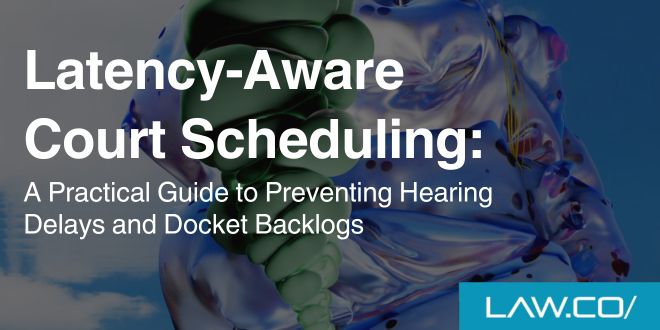

PPC for Lawyers: How to Increase ROI With Digital Ads
Success as a lawyer depends on your ability to attract and retain clients.Naturally, if you do your job well, and you spend time networking, you should be able to build a reputation naturally and earn client referrals on a consistent basis.But if you want to continue growing, especially if you have an entire firm to manage, it's important to pursue other strategies related to traffic generation and lead generation. Referral networks and word of mouth are great, but they aren't going to provide you with the consistent, ballooning growth that top-performing firms enjoy.One key strategy for law firm lead generation is pay per click (PPC) advertising.But how exactly does it work?And how can you make sure you see the highest possible return on investment (ROI) from this strategy?What Is PPC for Lawyers?

SourceWe'll start with the basics, in case you're new to this strategy.PPC stands for pay per click, an advertising strategy so named and defined because in it, you're only going to pay for each click that your ads generate. For example, you might consistently run an ad and pay $1 for each person who clicks on it; if nobody clicks on it, you won't pay anything, and if 1000 people click on it, you'll pay $1,000.PPC advertising is available through several mainstream channels, including Google Search, Facebook, and Bing. While each channel has a slightly different approach and different sets of data for you to work with, they all share similar philosophies and processes.In the back end of a PPC advertising management platform, you'll be able to research keywords, competitors, and even audience preferences. With that knowledge, you'll be able to write and design advertising that caters to your target audience. From there, you'll be able to bid on strategically relevant keywords and circulate your advertisements wherever they'll be most effective.These platforms also provide transparent data streams, so you can continually evaluate your performance and make adjustments. Better, more engaging advertisements entitle you to higher quality scores, which gives you even more benefits when advertising on that platform in the future.You can use PPC ads to direct users to almost anywhere. Most commonly, lawyers direct leads to a central website or a landing page on that website designed for these specific users. But you can also direct people to a social media page, a product page, or any other online destination.Does PPC Advertising Work for Lawyers and Law Firms?So does it work?The short answer is yes. Millions of lawyers and law firms all over the world rely on PPC advertising to spread the word about their services and attract more leads.PPC advertising is, by definition, effective at generating traffic; you only pay for the traffic you generate. But as we'll see, there are more variables to consider when evaluating effectiveness, and there are strategies that can push effectiveness higher in this space.The critical advantages offered to law firms by PPC advertising include:
- Immediate traction. Compared to strategies like content marketing and search engine optimization (SEO), PPC advertising is incredibly fast. In the span of a single afternoon, you can set up your account and start advertising. As long as you have the budget to pay for it, you can generate traffic continuously. You don't have to spend months building up an archive of content, nor do you need to wait years for your website to mature; you can see a guaranteed stream of traffic right now.
- Niche targeting. Lawyers also love PPC advertising for its ability to target very specific niche audiences. Since you'll mostly be dealing with huge, mainstream tech platforms, you'll be able to utilize thousands of different data points when choosing your target audience. You'll be able to select people based on location, demographics, and even search history, so you only bring people to your landing page if they fit your target market perfectly. This should greatly improve the quality of the leads you generate, reduce waste, and allow you to create much more relevant advertising.
- Total budget control. Do you only have $500 a month to spend? You can use PPC advertising. Do you have a monthly budget of $50,000 at your disposal? PPC advertising will generate even more traffic for you. In this strategy, you'll have total control over your budget, and you'll be able to direct your spending however you see fit.
- Ongoing analysis. Access to analytics is huge in the PPC world, helping you understand with great precision which of your advertisements are working and which ones are falling short. Through ongoing analysis, you'll be able to learn more about the behavioral patterns of your target demographics and ultimately see better results.
- Unlimited potential growth. Speaking of results, there's practically unlimited growth potential here. The more you learn, the more you spend, and the more aggressive you get, the more leads you'll generate and the better quality those leads will be. PPC advertising doesn't have the exponential or explosive growth potential that SEO and content marketing do, but with the right mindset, you can keep pushing your returns higher.
There are a few drawbacks to PPC advertising worth considering in the legal industry, however.
- Linear growth. The growth in PPC advertising is somewhat linear. As you get better at this form of advertising, the gains are going to become smaller and smaller – and the introduction of a new competitor could seriously disrupt your strategy.
- (Arguably) higher cost basis. Though costs are variable, it's generally true that PPC advertising is more expensive as a form of traffic generation than content marketing or SEO. If you're looking for immediate traffic or very specific demographics, this extra cost is more than worth it. But as your other organic marketing strategies developed, you may come to prefer them over PPC ads.
- Plateau problems. Improving ad performance in PPC advertising requires ongoing learning and experimentation. Even the best PPC advertisers eventually encounter plateaus, where it feels like you've hit a growth wall or that there are fewer gains to be made. These plateaus are addressable, but they can be very challenging.
- Requirement for ongoing investment. Strategies like content marketing and SEO have benefits that persist even if you stop investing in them; even if your budget dries up tomorrow, you'll still have entire archives of content and permanent assets to work with (not to mention enhanced domain authority). But if you want to keep seeing the results of PPC ads, you'll need to keep paying for them.
PPC vs. SEO for LawyersHow does PPC advertising stack up to SEO in terms of benefits to lawyers and law firms?PPC advertising is faster, more immediate, and much easier to experiment with. It also gives you access to more specific target demographics.SEO is slower and features a steeper learning curve, but it also has better long-term growth potential. It's less expensive, it's a more synergistic strategy within your marketing department, and it can generate highly relevant, organic streams of traffic.As you can see, the core strengths of these marketing strategies are complementary. PPC thrives where SEO fails and SEO thrives where PPC fails. Accordingly, lawyers and law firms are arguably best off pursuing both.PPC vs. Lead Buying for Lawyers

SourceAccording to the American Bar Association, 49 percent of law firms claim their best marketing channel/strategy is buying web leads. In this approach, you'll seek a third-party partner and pay them for each lead they send your way.How does PPC advertising compare to this strategy?It's hard to make a direct comparison, since lead buying takes so many different forms. However, generally, PPC advertising has the potential to be more cost effective and give you a broader reach. No matter who you're working with, there's going to be an upper limit to the number of leads you buy – but PPC advertising gives you access to a far deeper lead pool.Additionally, PPC advertising may be superior in terms of audience targeting. In many cases, lead buying entitles you to prequalified leads, but with PPC, you can target individuals with pinpoint accuracy.How Lawyers and Law Firms Can Make PPC Advertising WorkPPC isn't a magic solution.It doesn't give you results just because you flip a switch or pay an invoice.If you want your law firm to benefit from PPC advertising, you need to commit to the following:
- Work with an expert. It's not hard to master the basics of PPC advertising, but going beyond the fundamentals requires genuine expertise. If you're willing to make the time commitment to learning these nuances, you can; but if you want immediate access to this expertise, you'll need to hire an expert. That could mean working with a PPC advertising firm, hiring a PPC expert, or working with a contractor who has significant experience.
- Start with specific goals. You'll get more out of PPC ads if you have a clear vision for how you want to use them. Who is your target market? What kind of traffic streams do you want to generate? How will you convert those leads when you receive them?
- Research your target audience. The better you know your audience, the more effective your PPC campaign will be. Not only will you know exactly who to target, but you'll also have greater audience awareness so you can write more compelling, persuasive ads.
- Set a budget. PPC ads are available to lawyers with almost any conceivable budget, but it's important to set your budget proactively if you want to make the most of it. If you're new, a budget of $500-$1,000 a month is a great place to start.
- Choose one (or more) platforms. Your target audience is likely to use some platforms more than others. Start your PPC campaign with the channel most likely to resonate with your target demographics.
- Perform keyword and competitive research. Google, Facebook, and other PPC advertising platforms give advertisers ample tools to perform keyword and competitive research – so take advantage of them. The better you understand your competitive niche and your keyword environment, the better your strategic selections are going to be. You should aim to have a selection of keywords that are simultaneously highly relevant to your target audience, low in terms of competition, and capable of securing high volume. This is often a tough balance to strike.
- Build conversion-optimized landing pages. Generating traffic means nothing if you can't convert the visitors you generate. That's why it's so important to build landing pages perfectly optimized for conversions; consider building different landing pages for different audiences, and test those landing pages so you know they're effective. If you struggle to see a conversion rate in line with industry averages, you'll need to be willing to overhaul your landing pages.
- Experiment with ads. Video, image, and carousel ads each have something to offer, though not all of these ads are going to be relevant to all of your audiences. The best way to discover strengths and weaknesses, and gradually optimize your ads to perfection is to experiment with them directly.
- Take advantage of remarketing. Remarketing ads allow you to indirectly advertise to people who have already visited your website. This is an excellent strategy for recapturing potential leads who might have wandered off prematurely. Consider using them as part of your overall approach.
- Be ready to receive leads. Roughly 42 percent of the time, law firms take 3 or more days to respond to a message from a lead or potential client. This is extremely detrimental, as faster responsiveness leads to greater client acquisition and higher client satisfaction. If you want your law firm to be competitive, you need to be ready to receive and respond to leads quickly. Remember, PPC ads can start generating traffic almost instantly.
- Measure, analyze, and adjust. Study your analytics closely to learn more about your performance and brainstorm about the future of your campaign. PPC advertising demands that you experiment, make tweaks, and aggressively scrap whatever isn't working.
How to Write Better PPC Ads for a Law FirmSome of your success in the PPC advertising realm is going to depend on your ability to write compelling advertisements for your law firm.These are some tricks that can help you do it:
- Speak directly to your target audience. Don't fall into the trap of writing generic advertisements, with the vain hope of reaching as many people as possible. Instead, it's better to alienate some people in the pursuit of speaking directly and exclusively to the most relevant people to your law firm. Your ads need to be hyper-specific and engaging, especially if it means turning away people who don't fit your ideal client persona.
- Create something original. Advertising isn't new. PPC ads aren't either. People have seen millions of ads throughout their lives, and they don't want to waste time on materials that are mundane or repetitive. You need to differentiate your law firm in your advertising, creating something original for your messaging.
- Focus on stoking an emotional response. PPC ads are much more effective if they stoke an emotional response. Make people feel excited, hopeful, nervous, or comforted; any sufficiently strong emotion could lead them to action.
- Use numbers, trademarks, and register marks. It's a simple technique, but an effective one; use numbers, trademarks, and register marks in your PPC ads to help them stand out above the fold.
- Anticipate and address objections. You may not always have space to do this, but when you do, anticipate and address possible objections. What would stop a person from clicking on this ad or reaching out to your law firm? How can you overcome that possible obstacle?
- Include strong, persuasive calls to action (CTAs). Finally, make sure to include a strong call to action (CTA). In other words, prompt your users with action words to compel them to click through; experiment with different versions to see which one is the most motivating.
Are you struggling to see a positive ROI with your current approach to marketing and advertising your law firm?Are you interested in getting started with PPC ads or streamlining your lead generation process?We can help.We’ve got the tools, the experts, and the experience to put more leads in contact with your law firm – and more money in your pocket.Everything starts with a free consultation – so contact us today to get yours!

%201.svg)










